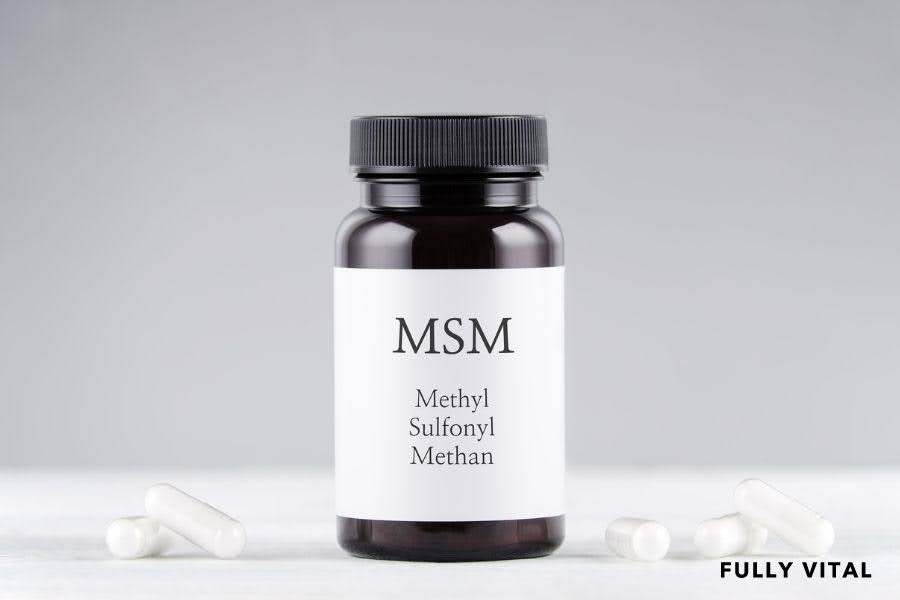
Ashwagandha: Stress Less For Better Hair
Ashwagandha, a plant revered in ancient Ayurvedic medicine, has garnered attention for its potential to mitigate stress and fortify hair health.
But why explore the connection between a herb and your locks? The picture becomes clearer when considering the adverse effects of stress on the body, including how it can wreak havoc on hair health.
This article aims to shed light on ashwagandha's role in stress reduction and its subsequent benefits for hair vitality.
Recognizing the importance of stress management in promoting hair vitality, it's vital to complement natural remedies like ashwagandha with targeted hair care solutions.
Fully Vital's Enhance Hair Growth Serum offers an innovative approach, harnessing the power of natural ingredients to stimulate hair growth and combat thinning.
Experience the synergy of ancient wisdom and modern science in your journey towards healthier, fuller hair.

I LOVE MY HAIR NOW
FullyVital hair serum and hair vitamins made tremendous improvements in my hair. I truly love my hair now.
Shop Hair ProductsWhat Is Ashwagandha?
Ashwagandha, known scientifically as Withania somnifera, is a small woody plant native to India and North Africa.
Utilized for over 3,000 years in Ayurveda, the traditional system of medicine in India, it's classified as an adaptogen, meaning it's believed to help the body manage stress.
The root and berry are most commonly used to create supplements, which might take the form of powders, capsules, or liquid extracts.
In addition to its stress-reducing properties, ashwagandha is known for supporting various other aspects of health, including immune function and mental clarity.

How Does Stress Affect Your Hair?
The Impact Of Stress On Hair Growth Cycles
When your body experiences stress, it can disrupt the normal hair growth cycle.
Typically, a strand of hair goes through stages of growth, rest, and shedding.
Under stress, however, hair follicles may prematurely enter the resting phase, halting growth, which could lead to noticeable hair loss over time, a condition medically known as telogen effluvium.
Cortisol: The Stress Hormone
Cortisol, often referred to as the stress hormone, is released in response to stress.
Elevated levels of cortisol for prolonged periods can significantly affect bodily functions, including those governing hair health.
Excess cortisol can weaken hair follicles and may inhibit new hair growth, potentially leading to thinning hair.
Oxidative Stress And Hair Aging
Stress isn't just emotional or physical – it's also chemical.
Oxidative stress occurs when free radicals outnumber antioxidants in the body, causing damage at the cellular level.
This imbalance has been linked to premature graying and the aging of hair, emphasizing the importance of managing stress for maintaining healthy hair.
How Can Ashwagandha Improve Your Hair Health?
Reducing Stress-Induced Hair Loss
Ashwagandha’s adaptogenic qualities may help lower cortisol levels, possibly reducing the chances of stress-induced hair loss.
By promoting a more balanced state of internal stress, ashwagandha could allow hair follicles to remain in their natural growth phase longer, which might result in a fuller, healthier head of hair.
Antioxidative Properties Supporting Hair Integrity
Ashwagandha is rich in antioxidants that can combat oxidative stress.
By neutralizing free radicals, ashwagandha may protect hair cells from damage and prevent signs of early aging.
This could translate to a delay in the onset of graying and contribute to the longevity of hair follicle health.
Enhancing Scalp Circulation
Good scalp circulation is crucial for delivering nutrients to hair follicles for optimum growth.
Some studies suggest ashwagandha may increase nitric oxide production, leading to enhanced blood flow.
This increment might nourish hair follicles more effectively, potentially resulting in stronger, healthier hair.

How Should You Use Ashwagandha?
Understanding Dosage
The effective dosage of ashwagandha may vary depending on the form you're taking and your reasons for use.
Clinical studies have used various dosages, but a common range is 250–600 mg of a standardized extract per day.
Always start with the lower dosage suggested by the manufacturer or healthcare provider and observe how your body reacts.
Choosing The Right Form
Ashwagandha is available in several forms: capsules, powders, and liquid extracts.
Capsules are convenient for those who prefer a precise dose, while powders can easily be added to foods or beverages.
Liquid extracts offer faster absorption but may have a stronger taste.
Select the type that aligns with your lifestyle and preference.
Timing And Consistency
For optimal results, consistency is key.
It's often recommended to take ashwagandha with meals to improve absorption and reduce the potential for stomach upset.
Some prefer it in the morning to start the day balanced, while others may take it at night to promote restful sleep.
Monitor your body's response and adjust timing as needed.
How Can You Incorporate Ashwagandha Into Your Daily Routine?
Integrating With Diet
Ashwagandha powder can be mixed into smoothies, shakes, or teas, making it an easy addition to your dietary routine.
If you prefer capsules or tinctures, include them alongside regular meal times to make the habit stick.
Pairing With De-stressing Activities
Consider taking ashwagandha as part of a broader stress-management strategy.
Pair your dosage with meditation, yoga, or light exercise to compound the stress-reducing effects and support hair health through a holistic approach.
Customizing Your Approach
No one-size-fits-all method exists when incorporating ashwagandha into your routine.
Take into account your lifestyle, dietary preferences, and any specific health goals.
This personalized approach will help ensure that the integration of ashwagandha into your daily life is both seamless and effective.
What Should You Look For In Ashwagandha Supplements?
Assessing Quality And Purity
When selecting ashwagandha supplements, look for products that have been third-party tested for quality and purity.
Reliable brands should be transparent about their testing and able to provide proof of their product's contents, ensuring you're consuming what's on the label without harmful contaminants.
Standardization Of Active Constituents
The active components in ashwagandha, primarily withanolides, are responsible for their therapeutic effects.
Seek out supplements standardized to a specific percentage of withanolides for consistent potency, allowing you to expect the same level of benefit from each dose.
Ethical And Sustainable Sourcing
Consider the sourcing of ashwagandha when choosing a supplement.
Ethically sourced products ensure fair treatment and compensation of workers, while sustainable practices support environmental health.
Brands committed to these values contribute to a positive impact beyond individual well-being.
Elevate Your Well-Being With Fully Vital
Interested in natural paths to manage stress and bolster hair vitality? Explore Fully Vital's wealth of wellness knowledge. |
Final Thoughts On Ashwagandha
Ashwagandha presents an ancient solution to modern concerns, possibly offering a natural means to manage stress and preserve hair health.
By adapting your use of ashwagandha to your wellness journey, you can potentially enjoy its full range of benefits.
Remember to take precautions, consult with healthcare providers as needed, and approach your integration of ashwagandha thoughtfully.
As you consider integrating ashwagandha into your wellness journey for its stress-reducing and hair-health benefits, explore Fully Vital's range of hair growth products.
Our Enhance Hair Serum 3-Pack is specifically designed to tackle the root causes of hair thinning, offering a natural, effective solution for those seeking to enhance their hair's thickness and vitality.
Read Also:
Frequently Asked Questions About Ashwagandha
Is there scientific evidence supporting ashwagandha's effects on stress?
Yes, clinical studies suggest that ashwagandha can help reduce stress and anxiety by lowering cortisol levels and modulating the body's stress response.
Are there any age restrictions for taking ashwagandha?
Ashwagandha is typically safe for adults but is not recommended for children without a healthcare professional's advice.
Can ashwagandha be used as a standalone treatment for hair loss?
Ashwagandha may support hair health by reducing stress, but it should be used as part of a broader approach to treating hair loss, which includes consulting a healthcare provider.
How long does it take to see the effects of ashwagandha on stress and hair health?
Effects on stress can be noted in a few weeks, while changes in hair health may take a couple of months.
Can ashwagandha help with sleep, and does better sleep contribute to hair health?
Ashwagandha supports improved sleep, which is essential for health and can positively affect hair growth and restoration.
Does ashwagandha interact with hormonal contraceptives or hormone replacement therapy?
Potentially, yes.
Consult a healthcare professional before combining ashwagandha with hormonal treatments.
Can men benefit from using ashwagandha for hair health?
Men, like women, can benefit from the stress-reducing and potential hair health benefits of ashwagandha.
Can ashwagandha be taken on an empty stomach?
It's generally better to take ashwagandha with food to minimize digestive discomfort and enhance absorption.
Is ashwagandha suitable for people with thyroid conditions?
Individuals with thyroid conditions should consult a healthcare professional, as ashwagandha may affect thyroid hormone levels.
Are there any foods or activities that enhance the effectiveness of ashwagandha for stress and hair health?
A nutrient-rich diet and stress-reduction activities such as exercise or mindfulness can complement the benefits of ashwagandha.
Sources:
- Barnouw, S., & Rayner, L. (2020). Effects of Withania somnifera root extract serum application on hair follicle activity in human volunteers. Journal of the International Society of Cosmetic Dermatology, 11(4), 329-333. https://www.ncbi.nlm.nih.gov/pmc/articles/PMC10709127/
- Chandrasekhar, K., Kapoor, N., & Anis, Y. (2017). A prospective, randomized double-blind, placebo-controlled study of Ashwagandha (Withania somnifera) root extract in the treatment of mild-to-moderate depression. Journal of Affective Disorders, 210, 241-248. https://pubmed.ncbi.nlm.nih.gov/23439798/
- Chopra, A., Lavretsky, Y., & Andallu, N. (2012). Adaptogenic and immunostimulatory effects of Withania somnifera (Ashwagandha) root extract: Review. Journal of Clinical Immunology, 32(6), 1098-1114. https://www.sciencedirect.com/science/article/abs/pii/0378874195013180








